|
|
|
Sort Order |
|
|
|
Items / Page
|
|
|
|
|
|
|
| Srl | Item |
| 1 |
ID:
132342
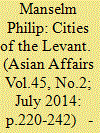

|
|
|
|
|
| Publication |
2014.
|
| Summary/Abstract |
Global cities are almost by definition somewhat detached from their geographical hinterlands. Cosmopolitan and modern, they are open to external influences from other cultures and from overseas trade. But they are also vulnerable to the rise of nationalism in the country which surrounds them, as is shown by the fate of three famous cities of the Levant, Alexandria, Smyrna and Beirut. They were multicultural trading cities, linking the economies of Europe and Asia, "windows on the world", in contrast to inland capitals like Cairo Ankara and Damascus. New global cities like London, Hong Kong and Dubai also have hybrid and polyglot inhabitants, like Levantine cities of bygone days. But they will need support if their cosmopolitanism is to prevail over nationalism.
|
|
|
|
|
|
|
|
|
|
|
|
|
|
|
|
| 2 |
ID:
172377


|
|
|
|
|
| Summary/Abstract |
This article looks at drug trafficking, trade, and pilgrimage between Lebanon, Syria, and Palestine during the mandate period, arguing that a Levantine geography continued both as lived experience and conceived space even after the introduction of borders post-WWI. Drawing on the work of Patrick Hutton, it argues that Levantine geography can only be understood by reformulating the relationship between history and memory and bringing in the lived experience of Levantines into the writing of history.
|
|
|
|
|
|
|
|
|
|
|
|
|
|
|
|
| 3 |
ID:
172374
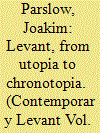

|
|
|
|
|
| Summary/Abstract |
This essay responds to this special issue’s challenge of thinking the Levant through Bakhtin’s notion of the chronotope, with a theoretical reflection on the potentials and limitations of chronotopic thought in social and historical scholarship. The essay is structured around two questions. First, given the overwhelmingly literary associations with which we tend to approach Bakhtin’s thought today, is the chronotope a tool for literary analysis only, or is it applicable to other forms of communication, cognition, and action? Second, what implications does chronotopic analysis have for scholarship that seeks methods of analysing and writing about the Levant in a historically and politically responsive way? Should chronotopes always be understood as the a priori horizon of meaningful narration, as frameworks that make certain plots, events, interpretations, and actions possible while precluding others, or are they also an observable and manipulatable aspect of communication, one that can be subject to the quotidian equivalent of authorial intention, creative reception, and political contestation? Placing the chronotope in the context of Bakhtin’s earlier philosophical project, I argue that although the chronotope facilitates the reflexivity and subversiveness which Bakhtin sees as defining and ethically necessary achievements of modern discourse, these characteristics are both self-limiting and morally ambiguous.
|
|
|
|
|
|
|
|
|
|
|
|
|
|
|
|
| 4 |
ID:
158221
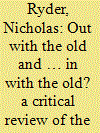

|
|
|
|
|
| Summary/Abstract |
The aim of this article is to critically consider the effectiveness of the “Financial War on Terrorism” on the funding streams of the Islamic State of Iraq and Levant (ISIL). The article begins by identifying that the origins of the “Financial War on Terrorism” can be found in the international efforts to tackle money laundering. It then moves on to consider if the “Financial War on Terrorism” is able to tackle the funding streams of ISIL. The article concludes that the “Financial War on Terrorism” is no longer fit for the purpose to tackle the funding streams of ISIL.
|
|
|
|
|
|
|
|
|
|
|
|
|
|
|
|
| 5 |
ID:
187761
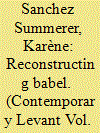

|
|
|
|
|
| Summary/Abstract |
How was missionary knowledge received and interpreted by scholars and church historians in Europe and Russia? Many late nineteenth and early twentieth-century academics utilised knowledge production from Christian missions, notably by way of scholarly Orientalism. However, the history of this knowledge is also a history of representations: while missionary knowledge helped showcase the cultural and religious traditions of Eastern Christianity, what were the underlying motives and especially the consequences? This article examines the formulation and circulation of Eastern Christian knowledge on either side of the Mediterranean, especially on the basis of Catholic missionary archives and academic productions, the study of which is sometimes rooted in non-Anglophone academic traditions. The aim is to shed light on how knowledge relating to Eastern Christianity was assimilated in Europe, as well as the role missions played in this process, especially from the last third of the nineteenth century, when the institutions and instruments for the circulation of knowledge emerged. Another objective is to address the circulations and transformations of this knowledge on either side of the Mediterranean: collected and developed in major European libraries and universities, it was integrated by the governance structures of churches, but quite often also returned to the space it originated from, where it was reappropriated and gave rise to patrimonial processes, notably alongside the sometimes tragic experiences of certain communities during the end of the Ottoman Empire and the establishment of new states. Christian missions, at the intersection of East and West, were at the heart of this dynamic .
|
|
|
|
|
|
|
|
|
|
|
|
|
|
|
|
| 6 |
ID:
171871
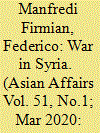

|
|
|
|
|
| Summary/Abstract |
Many existing studies on the war in Syria offer important insights but none fully engages the longue durée of history and its implications. Syria like many other states in Asia was established and institutionalized in the context of the growth and expansion of a capitalist world economy centred in Europe. The Franco-British reorganization of the Levant between the two world wars was supposed to support long-term processes of wealth accumulation and economic growth but forceful integration in the world economy set the stage instead for nationalist backlashes, economic crises, and war. Indeed, one of the driving forces of conflict in Syria as well as in other parts of the developing world has been the recurrence of struggles between those pushing for ever greater capitalist integration and those resisting such efforts in the name of alternative ideologies, including communism, Pan-Arab nationalism, and various distinct currents of political Islam. To demonstrate these dynamics, this paper will present a sweeping overview of the history of Syria and of the greater region, from Ottoman times to the present. It will also examine in detail the war that broke out in Syria in 2011, highlighting how it relates to broader struggles unfolding across the immediate region and beyond.
|
|
|
|
|
|
|
|
|
|
|
|
|
|
|
|
|
|
|
|
|